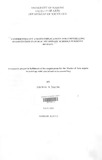| dc.description.abstract | The main objective of this research was to investigate confidentiality and its implication for counselling interventions in public secondary schools in Kikuyu division. The study objectives were: (i) to examine the confidentiality aspects considered by teacher counsellors in school counselling interventions. (ii) To analyse the confidentiality aspects considered by students while seeking consent in their schools. (iii) To identify the factors that hinder the teacher counsellor from observing confidentiality in school counselling interventions.
To achieve the objectives of the study both quantitative and qualitative research methodologies were used. A questionnaire comprising of open and crossed questions was administered to 21 schools. Using purposive sampling, 45 questionnaires were filled by the teacher counsellors. A focus group discussion was held with the students. Simple random sampling was used to select 5 schools and 20 students were further selected from each school for the focused group discussions. This gave qualitative data which was used to provide more insight obtained from the quantitative data.
Among the major findings, confidentiality is a key element in counselling interventions. Confidentiality is necessary in establishing the degree of trust for counselling to take place. However for confidentiality to be achieved several aspects must be explored. These aspects are: Assurance, consent seeking, disclosure. referrals. and record keeping.
The study further observed that beside confidentiality aspects, there are other factors at play which also need attention for they enhance confidentiality. These factors are: school administration structure, counselling room. dual role of teacher counsellor, use of information gathered during counselling, other parties interested in knowing the confidential counselling information.
Among the major recommendations made by this study was that the specific elements of confidentiality should be studied further 10 understand their individual implications to maintenance of confidentiality in school counselling. Further. the study recommends that teacher counsellors be equipped with basic counselling skills. Such
training should be coordinated at divisional level to harmonise skills and encourage exchange of ideas. From the study, the dual role of teacher counsellors and supervision by non counsellor head teachers were isolated as key hindrances to maintenance of confidentiality in school counselling interventions. The study therefore recommended that teacher counsellor should not be assigned teaching roles to the same students they offer counseling services. The counseling departments should be de-linked from the overall school administration structure to facilitate maintenance of confidentiality in counseling | en |

